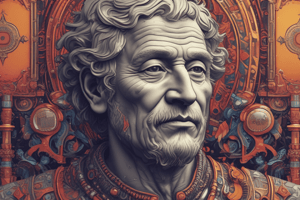Podcast
Questions and Answers
Which of the following best defines eudaimonia?
Which of the following best defines eudaimonia?
- A state of enjoying material wealth
- High levels of social interaction
- A person's state of well-being or happiness (correct)
- The absence of pain and suffering
According to Plato, happiness is associated with which of the following?
According to Plato, happiness is associated with which of the following?
- Worldly success and fame
- The pursuit of pleasure
- Overcoming personal suffering
- Living a moral life and practicing virtues (correct)
Epicurus defines happiness as a life that is free from what?
Epicurus defines happiness as a life that is free from what?
- Material possessions
- Emotional attachments
- Social responsibilities
- Fear and discomfort (correct)
What element of happiness involves the ability to control one's own destiny?
What element of happiness involves the ability to control one's own destiny?
Utilitarianism is best described as:
Utilitarianism is best described as:
The action of not killing or stealing aligns with which of the following aspects of the Noble Eightfold Path?
The action of not killing or stealing aligns with which of the following aspects of the Noble Eightfold Path?
Which of the following is NOT considered one of the distinct elements of happiness?
Which of the following is NOT considered one of the distinct elements of happiness?
According to Aristotle, the primary reason for human action is based on:
According to Aristotle, the primary reason for human action is based on:
Flashcards are hidden until you start studying
Study Notes
Happiness Defined
- Happiness can be viewed as a positive state of mind or an evaluation of life experiences.
- Eudaimonia, meaning "good spirit," signifies a state of well-being or happiness.
Philosophical Perspectives on Happiness
- Greek philosophers believed happiness is achievable and essential for a good life.
- Plato associated happiness with a moral life, virtuous behavior, and fulfilling duties.
- Aristotle viewed happiness as the driving force of human actions, achieved through virtuous conduct and excellence.
- Epicurus emphasized a peaceful life free from anxieties and discomfort as the path to happiness.
- Religious philosophers, such as St. Augustine and St. Thomas Aquinas, defined happiness as unity with God.
Utilitarianism
- Utilitarianism proposes that moral actions are those that maximize overall happiness for others.
Three Elements of Happiness
- Contentment: Satisfaction with one's life.
- Welfare: Fulfillment of personal wants and desires.
- Dignity: The ability to control one's destiny and live a life of personal choice.
Achieving a Happy Life (Eastern Philosophy)
- Eastern philosophers believe that happiness is attained through practical actions, not abstract ideas.
- Buddhism's Noble Eightfold Path outlines eight practices to achieve a good life:
- Right Faith: Understanding that life involves suffering, but this suffering has a cause, an end, and a means to achieve that end.
- Right Thought: Freedom from lust, cruelty, and harmful intentions.
- Right Speech: Avoiding lies, slander, and harsh language.
- Right Action: Abstaining from killing, stealing, immoral sexual behavior, and intoxicating substances.
Studying That Suits You
Use AI to generate personalized quizzes and flashcards to suit your learning preferences.





